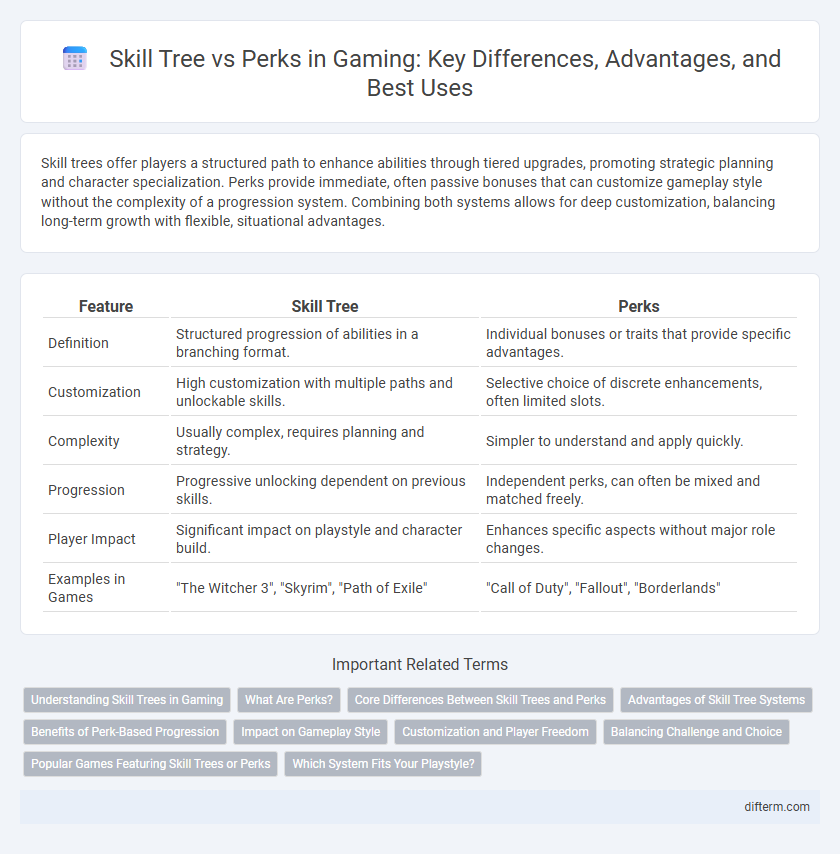Skill trees offer players a structured path to enhance abilities through tiered upgrades, promoting strategic planning and character specialization. Perks provide immediate, often passive bonuses that can customize gameplay style without the complexity of a progression system. Combining both systems allows for deep customization, balancing long-term growth with flexible, situational advantages.
Table of Comparison
| Feature | Skill Tree | Perks |
|---|---|---|
| Definition | Structured progression of abilities in a branching format. | Individual bonuses or traits that provide specific advantages. |
| Customization | High customization with multiple paths and unlockable skills. | Selective choice of discrete enhancements, often limited slots. |
| Complexity | Usually complex, requires planning and strategy. | Simpler to understand and apply quickly. |
| Progression | Progressive unlocking dependent on previous skills. | Independent perks, can often be mixed and matched freely. |
| Player Impact | Significant impact on playstyle and character build. | Enhances specific aspects without major role changes. |
| Examples in Games | "The Witcher 3", "Skyrim", "Path of Exile" | "Call of Duty", "Fallout", "Borderlands" |
Understanding Skill Trees in Gaming
Skill trees in gaming represent a structured progression system where players unlock abilities by investing points into specific branches, enhancing character customization and strategic depth. Unlike perks, which are often one-time bonuses or passive traits, skill trees require deliberate planning to develop a character's unique playstyle over time. Mastering skill trees enables players to optimize gameplay performance by unlocking synergistic skills and tailoring their avatar's strengths.
What Are Perks?
Perks are specialized abilities or bonuses that enhance a character's performance, offering tailored advantages like increased damage, faster reload speeds, or improved stealth. Unlike skill trees that often require gradual progression through various branches, perks provide immediate, focused enhancements that can be equipped or swapped to suit different playstyles. These customizable traits give players strategic flexibility, allowing them to optimize gameplay by boosting specific skills without committing to a lengthy unlock path.
Core Differences Between Skill Trees and Perks
Skill trees offer a structured progression system allowing players to unlock abilities sequentially, emphasizing strategic planning and long-term character development. Perks provide immediate, often standalone bonuses or enhancements that can be selected freely without strict prerequisites, offering flexibility and customization. The core difference lies in skill trees fostering gradual advancement through interconnected skills, while perks enable quick, targeted upgrades to adapt to specific playstyles.
Advantages of Skill Tree Systems
Skill tree systems offer players structured progression paths that enhance character customization and strategic depth in gaming. They allow gradual unlocking of abilities, providing clear milestones and fostering long-term player engagement. Unlike perks, skill trees visually represent growth potential, making it easier to plan and optimize character builds.
Benefits of Perk-Based Progression
Perk-based progression offers players tailored enhancements that directly improve gameplay mechanics, allowing for greater customization and immediate impact during sessions. Unlike traditional skill trees with linear dependencies, perks provide flexibility to adapt strategies quickly and experiment with diverse playstyles. This system encourages dynamic player engagement by rewarding specific actions and play patterns with unique bonuses that enhance immersion and replayability.
Impact on Gameplay Style
Skill trees shape gameplay style by offering structured progression through unlockable abilities, allowing players to specialize in combat, stealth, or support roles based on chosen paths. Perks provide immediate, often passive bonuses or enhancements that fine-tune specific aspects of gameplay, such as faster reload times or increased critical hit chances. The combination of skill trees and perks creates a dynamic customization system, enabling players to tailor their experience with both broad strategic growth and targeted advantages.
Customization and Player Freedom
Skill trees offer structured customization paths that guide players through progressive ability unlocks, enhancing strategic depth and long-term planning. Perks provide immediate, flexible enhancements allowing players to tailor their gameplay style on the fly without rigid dependencies. The combination of skill trees and perks maximizes player freedom by balancing deliberate character development with spontaneous adaptability.
Balancing Challenge and Choice
Skill trees provide structured progression paths with defined abilities, promoting strategic long-term planning and skill investment. Perks offer customizable, often situational enhancements that grant immediate tactical advantages, encouraging experimentation and varied playstyles. Balancing challenge and choice involves ensuring skill trees maintain meaningful growth without overpowering, while perks introduce dynamic flexibility without trivializing core gameplay.
Popular Games Featuring Skill Trees or Perks
Popular games like The Witcher 3 and Dark Souls heavily utilize skill trees, allowing players to customize abilities and specialize their playstyle through a structured progression system. In contrast, titles such as Call of Duty and Borderlands emphasize perks, providing instant, often passive bonuses that synergize with character builds without deep branching paths. These design choices impact player strategy and replayability, with skill trees offering detailed customization and perks enabling quick enhancements.
Which System Fits Your Playstyle?
Skill trees offer a structured progression path allowing players to specialize in specific abilities, ideal for those who enjoy strategic planning and long-term growth. Perks provide flexible, often immediate bonuses that suit players seeking quick customization and adaptability during gameplay. Choosing between skill trees and perks depends on whether you prefer deliberate character development or dynamic, on-the-fly enhancements to fit your preferred gaming style.
Skill Tree vs Perks Infographic

 difterm.com
difterm.com